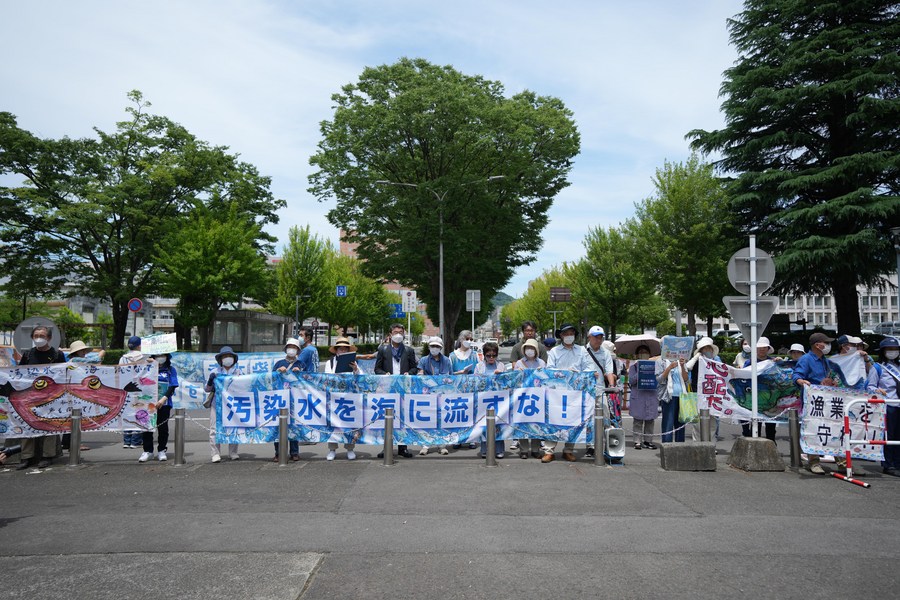Citizens decry toxic water release plan
By JIANG XUEQING in Tokyo | China Daily | Updated: 2023-07-19 10:05

80% of Japanese think govt explanation for discharge is insufficient, survey says
More than 80 percent of the Japanese public said the government's explanation regarding the release of treated nuclear-contaminated water into the ocean is "insufficient", according to a nationwide survey.
When asked if they thought reputational damage would occur from the release of the nuclear-contaminated water, 15.8 percent of respondents answered "significant damage", while 71.6 percent believed it would be damaged "to some extent".
The telephone opinion poll recently conducted by Kyodo News in Japan covered 1,034 respondents, which also found the approval rating of the administration of Prime Minister Fumio Kishida decline to 34.3 percent and near the lowest in his tenure, while the negative rating shot up 7 percentage points to 48.6 percent.
Katsuya Okada, secretary-general of the Constitutional Democratic Party of Japan, said the government needs to make efforts to explain and gain understanding from neighboring countries and fishermen.
Although the Japanese government and the Tokyo Electric Power Company said it is safe to discharge the filtered and diluted nuclear-contaminated water from the Fukushima Daiichi nuclear power plant into the ocean, the information disclosed remains limited, lacking sufficient scientific research to make the world believe in the environmental safety claimed by the Japanese government, said researchers from the Chinese Academy of Social Sciences, or CASS.
Opposition lawmakers from Japan, including members of the Constitutional Democratic Party of Japan, recently issued a joint statement with opposition lawmakers from South Korea, urging the Japanese government to reconsider the release of nuclear-contaminated water into the ocean.
The statement emphasized that in addition to the International Atomic Energy Agency, or IAEA, which was commissioned by the Japanese government to evaluate the environmental impact, the opinions of various environmental specialist organizations should be heard, and a thorough analysis and examination should be conducted, The Asahi Shimbun, a daily newspaper in Japan, reported.
Endangering marine life
By persisting in adopting a direct ocean discharge plan with minimal economic costs, the Japanese government is endangering the marine environment and posing risks to human health worldwide. The water discharge will undoubtedly cause unprecedented pollution to oceans, affecting the safety and development of the global marine industry, and threatening the life and health of coastal populations in affected countries, said Chen Xiang, an associate research fellow with the Institute of Japanese Studies at the CASS.
"Japanese citizens have held multiple rallies to protest against the plan. They are deeply aware that the Japanese government, under the leadership of Kishida, has disregarded public opinion and acted unilaterally on the issue of discharging nuclear-contaminated water. This not only represents a significant setback for Japan's environmental protection and peace efforts but also a major blow to Japan's self-proclaimed democratic system in the post-World War II period," Chen said.
Faced with grave concerns regarding the marine ecological environment and human health, the Japanese government has ignored opposition from the domestic fishing industry and the strong skepticism expressed by neighboring countries.
Instead, it has intensified its public relations efforts targeting certain countries and international organizations in an attempt to secure endorsements for the nuclear-contaminated water discharge plan. However, this has further exposed its lack of serious intention to address the issue, experts said.
"Japan's decision to discharge nuclear-contaminated water into the ocean clearly goes against the direction of global governance. Such actions will grossly violate relevant international laws and severely disrupt the order of international marine environmental governance," Chen said.
Hideki Okuzono, a professor of international relations at the University of Shizuoka, told The Asahi Shimbun that caution is necessary when it comes to the issue of treated water because this issue is not just about matters of national security or historical recognition, but it is a matter of food safety, the marine environment, and the health and life of the citizens.
Multiple activities were held among the Japanese public on Monday in opposition to the plan, as the country celebrated its Marine Day by giving thanks to the ocean.
In Iwaki city of Fukushima Prefecture, about a hundred Japanese, including residents and those who work in the fishing industry, gathered under the scorching sun to decry the government's planned discharge of radioactive wastewater from the crippled Fukushima nuclear power plant.
"Listen to the screams of Fukushima!" said Masahide Kimura from Koreumi, a Japanese citizens' conference to condemn further ocean pollution.
Xinhua contributed to this story.
























